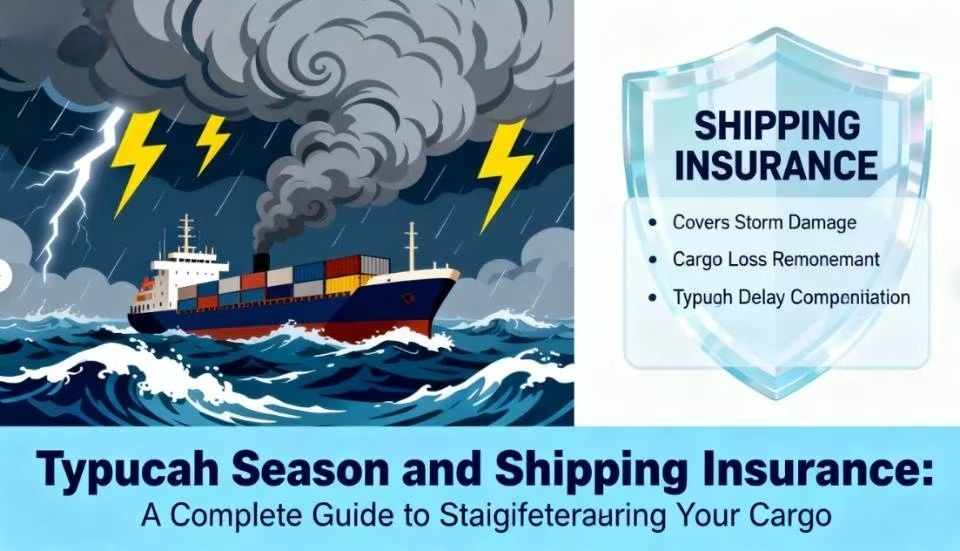Typhoon Season and Shipping Insurance: A Complete Guide to Safeguarding Your Cargo
Release time:
2025-09-28
Every year, as typhoon season approaches, foreign trade professionals face a common challenge: how to protect their goods from the extreme weather? The devastating impacts of Typhoon “Hato” in 2017, “Mangkhut” in 2018, and most recently, Typhoon “Haikui” on the Guangdong coast have left many memories of ports being paralyzed, container terminals in disarray, and shipping containers tossed around by strong winds, some even being blown into the sea. For those in foreign trade and freight forwarding, this means more than just bad weather—it’s a nightmare of lost cargo, water damage, and a disrupted supply chain. So how can you minimize these risks with shipping insurance? In this article, we will explain everything you need to know.
Impact of Typhoons on Container Shipping
Port Operations Suspended
When a typhoon hits, ports often close their yard areas ahead of time and suspend loading and unloading operations. This results in delays in ship arrivals and departures, pushing back shipment schedules.
Route Delays and Diversions
Typhoon conditions can cause ships to anchor or divert to safer routes, leading to delays in their estimated arrival times. Shipping lines may also skip ports or change their port calls, affecting transit connections.
Risk of Cargo Damage
Heavy rains can cause flooding in container yards, resulting in water damage to goods. Meanwhile, strong winds can overturn containers, leading to collapses and collisions, causing damage to the cargo.
Does Shipping Insurance Cover Typhoon Damage?
The answer is: Yes, but only if you’ve purchased the right insurance! If you’ve opted for All Risks insurance for maritime transport, then any damage caused by a typhoon—whether at the terminal or during transit—is covered. However, the key is to purchase insurance before the cargo leaves the warehouse, as damage occurring during the yard phase won’t be covered if you wait until the cargo reaches the port.
Example:
If your cargo is shipped from a factory in Foshan, goes through Shenzhen Yantian Port, and is then loaded onto a ship for export, as long as you purchase insurance before the cargo leaves Foshan, you’ll be covered for risks throughout the shipping process, including typhoon-related damage at the port. However, if you wait until the container arrives at the port to purchase insurance, any damage at the terminal will not be compensated.
Common Types of Shipping Insurance
Maritime Insurance
Free from Particular Average (FPA)
This covers the total loss due to major incidents (such as ship grounding, collision, sinking, fire, or explosion), as well as General Average losses. It typically does not cover partial losses, unless they occur due to the aforementioned incidents.
With Particular Average (WPA)
This insurance provides coverage for partial losses caused by natural disasters (such as harsh weather or seawater flooding), in addition to the coverage offered by the Free from Particular Average policy.
All Risks Insurance
The most comprehensive coverage, which includes protection against natural disasters, transportation accidents, collisions, and cargo stacking risks.
Land/ Air/ Postal Insurance
Overland Transportation Risks
This covers the loss of goods during land transport, including risks such as collisions, overturning, fire, and water damage.
Air Transportation Risks
This insurance protects cargo during air transport, covering damages, delays, or loss of goods. This is especially important for high-value and time-sensitive goods.
Parcel Post Risks
This insurance applies to small parcels and packages shipped via postal or courier services, covering loss, damage, or theft during transit.
General Additional Insurances
If you already have All Risks insurance, you may not need to purchase additional coverage. However, for more specific protection, you can add coverage for risks such as theft, water damage, breakage, contamination, and rust.
Insurance Package Recommendations for Different Cargo Types
General Cargo:
Recommended Combination: WPA + War/Strike Risks or All Risks
Reasoning: Even if your cargo isn’t fragile, water damage caused by typhoons can be covered under WPA, while other damages (such as those caused by accidental drops or collisions during loading/unloading) will require All Risks coverage. Although the premium for All Risks is higher than WPA, it’s worth the investment for comprehensive protection and to avoid disputes over coverage.
Bulk Commodities/ Fragile Goods:
Recommended Combination: All Risks + Deductible Clause
Reasoning: For fragile or hard-to-replace items, All Risks insurance is essential. A deductible clause can help lower the premium while still ensuring full compensation for any damage.
LCL Cargo (Less-than-Container Load):
Recommended Combination: All Risks + "Warehouse to Warehouse" Coverage
Reasoning: Since LCL shipments involve multiple handling points, the risk of damage is higher. "Warehouse to Warehouse" coverage ensures that every stage of the journey is covered, from the warehouse to the final destination.
How to Reduce Risk During Typhoon Season?
Purchase Insurance Early:
Ensure your insurance is in place before the cargo leaves the warehouse. This guarantees coverage for the entire shipping process, including risks during the port and transit phases.
Monitor Weather Alerts:
Stay updated with weather forecasts and alerts, and adjust your shipping schedule to avoid transporting goods during typhoon conditions.
Maintain Close Communication with Your Freight Forwarder:
During typhoon season, stay in close contact with your freight forwarding company to keep track of port operations, shipping delays, and any changes in routes or schedules.
Conclusion: Typhoons Are Unpredictable, But Shipping Insurance Can Help Manage the Risk
While typhoons are beyond our control, the risks they pose can be managed with the right shipping insurance. By selecting the right insurance package and ensuring it’s in place before your cargo begins its journey, you can protect your goods against potential damage and loss.
For more information, feel free to contact Passionship International Logistics, and our team will provide you with the best insurance solutions and transportation services to ensure your cargo is safely delivered, no matter the weather!










